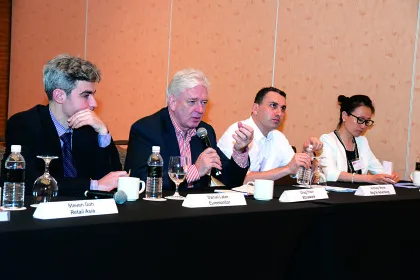
RETAIL ASIA FORUM Views on the Future of Retail
At the RETAIL ASIA Leadership Forum on November 10 in Singapore, keynote presenter Greg Thain, CEO of Storewars International, and other panellists shared engaging views about how retail will change, the use of technology, and new consumer trends. Sharon Tian reports.
Retail is at a very interesting point of development, with rapid and dynamic changes driven by new consumer trends, the rise of online retailing, and the development of data analytics.
Greg Thain, CEO of Storewars International and the keynote presenter at the RETAIL ASIA Leadership Forum, said that in the new operating environment, retailers need to focus on value-for-money – more so than size of store network and millions of SKUs. They also need to ensure efficient operations and quality offerings in terms of products and services. Technology is going to be a big enabler of business, helping retailers in the critical areas of delivery and fulfilment and understanding customer behaviour.
Thain said the phenomenal success of two “discount retailers” in Europe, Aldi and Lidl, points the way for retailers to build prime relationships with customers and strong customer loyalty. Instead of investing in big stores with millions of SKUs, these retailers of the future are setting the pace with their strategy of using private labels and stocking on limited brands but very high quality merchandise.
“Consumers realise that private labels produced by discounters like Aldi and Lidl are the best that they can buy.
“Increasingly quality discounters are using private labels to increase customer loyalty. They want the consumer to be loyal to [the retailer], not the manufacturer.”
Aldi and Lidl are also attacking ‘Fresh’, Thain said, seizing the opportunity to serve the rapidly growing middle-class population in large markets who want fresh bread, vegetables, and fruits.
With these new trends, size is not as important as before, what is important is efficiency.
Thain stressed that while we can now buy everything online with a few clicks, from luxury goods to potatoes, one of the critical areas for retailers is quality of delivery.
In addition, we will no longer be talking about e-commerce via computers or tablets or smartphones, but buying devices of different sizes. “Big, medium, or small-sized, everyone is buying through a device. ‘Click & Collect’ is going to be all-important,” Thain said.
The use of mobile devices for making purchases also enables consumers to compare prices and check user reviews and recommendations easily, creating added pressure on retailers.
Data drives the business. The ability to collect massive customer data from mobile devices and through in-store technologies and the use of big data analytics present retailers with a great opportunity to understand customer shopping behaviour, including how they interact with store specials, pricing movements and so forth.
“In summary, value-for-money is winning; ‘Fresh’ is increasingly important; everything can be bought online; consumers are following their own friends. The consumer is much more powerful today but retailers can track them more so, to see exactly what, where, and when they are motivated to buy.”
At the forum, Daniel Latev, head of Retailing at Euromonitor International, shared key data points from Euromonitor’s research to paint a profile of the consumer and retail market in Asia-Pacific. [See Euromonitor infographics on Asia Pacific Top 500 ranking research on page 32.]
In the region, the trends of shrinking households, consumers getting older but more connected and with rising disposable incomes translate to good market opportunities for relevant retailers.
Latev pointed out that there is a huge opportunity for modern grocery operations even though ‘discounters’ is still a new concept.
Drawing on Euromonitor’s extensive research, he also highlighted the high growth areas – Internet retailing, hypermarkets, health and beauty, hardline and convenience stores.
Latev said while there is huge potential for Internet retailing, retailers should not under-estimate the extent of offline research that consumers do. Euromonitor finds that 70-80% of purchase decisions are made in the store. Brick-and-mortar and online should not be seen as competitive channels but must work hand-in-hand for the consumer dollar.
Citing the examples of two retailers in the UK, Marks & Spencer and John Lewis, he said while both retailers invested in the digital and mobile selling channels, their different approaches led to vastly different results.
With Marks & Spencer, online is perceived as a different channel and department with its own business performance targets. In the case of John Lewis, the digital channel complements the physical store; when customers cannot find something they want in the store, the retailer provides a service for them to order online.
John Lewis also makes sure that revenue from its online business is attributed to the total sales for the region and this contributes to staff motivation. With a clear value proposition for its online business, the overall business of John Lewis has benefited.
The RETAIL ASIA Leadership Forum, organised by RETAIL ASIA, also had insights from panel members, Anthony Shiner, Chief Revenue Officer, SingTel Group Digital L!fe and Lynn Huang, Head of Marketing and Strategy, Asia Pacific, Honeywell Scanning & Mobility.



















 Advertise
Advertise





